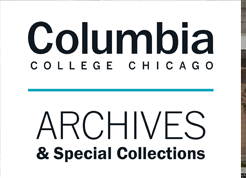

Files
Loading...
Description
Makeda Duncan was born in Chicago, Illinois and raised in the Wrigleyville neighborhood. Makeda has five siblings and currently resides with them in the Galewood neighborhood. Makeda is a commuter and her schedule on campus revolved around her commuting schedule. Makeda went to Lane Technical College Prep High School, which she describes it as a unique school with plenty of diversity in people and the classes. Makeda estimates her graduating class size was 900. She knew she would attend Columbia College Chicago because she has always wanted to attend for her major, ASL interpretation. She chose Columbia because of its creative people and to work with the deaf community. This is her sophomore year, with plans to graduate in 2022. Makeda is employed at the Student Center of Columbia. She sets up rooms and meeting spaces to ensure that students/teachers had all the right resources for their meetings.
Publication Date
5-2020
Publisher
Columbia College Chicago
City
Chicago
Keywords
ASL, interpretation, COVID-19, pandemic, Chicago, Illinois, United States, coronavirus
Creative Commons License

This work is licensed under a Creative Commons Attribution-NonCommercial-No Derivative Works 4.0 International License.
Disciplines
Arts and Humanities | Education | History | Social and Behavioral Sciences | Sociology
Recommended Citation
Sims, Jay'La, "Interview with Makeda Duncan" (2020). Capturing Quarantine Oral Histories. 18.
https://digitalcommons.colum.edu/capturingquarantine/18



Comments
Makeda Duncan’s interview begins with where she was raised, from Wrigleyville to Galelwood in Chicago. She describes her education at Lane Technical College Prep high school and she talks about how she always knew she wanted to go to Columbia for ASL interpretation and explains that she wanted to go to Columbia to meet more creatives that were interested in similar things as her. Makeda describes her quarantine living situation and mentions that all of her family is now working from home. Makeda then describes her reaction to campus shutting down and how she was concerned on how her ASL classes would continue. She explains that while most of their work was turned in online, she didn’t understand how they would be able to do interpretations through zoom. She opens up about some of the struggles she has been having now that school has switched to remote learning. She also describes some of the errors of communication teachers had with school starting back up. Finalizing the interview she discusses quarantine and how we can grow from it. Makeda gives advice to younger generations of how important it is to be aware of other people and their own situations.” Of course, it's a physical separation, but you don't have to disconnect.” Makeda states.
Conducted in spring 2020 by an Oral History: The Art of the Interview student, this interview with a fellow student in the class reflects on the pandemic and how it impacted their life. The interview is conducted based on the life history approach to oral history.